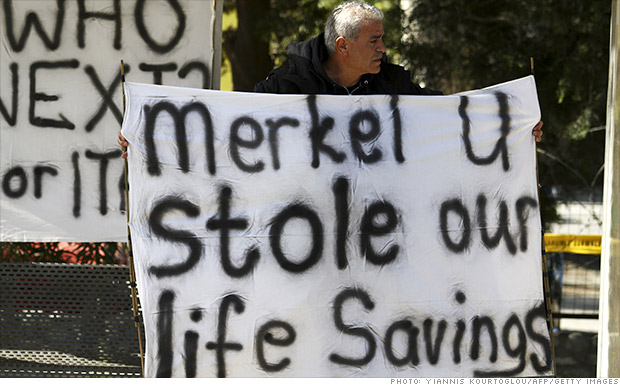
Cypriots protested the proposed EU bailout, which would require Cyprus to impose a one-time tax on bank deposits.
LONDON (CNNMoney)
Cyprus delayed by 24 hours a vote in parliament on a controversial plan to rescue the tiny island nation, and eurozone finance ministers were reported to be preparing emergency talks Monday to prevent the plan from backfiring.
An unprecedented tax on bank deposits as part of the €10 billion rescue announced Saturday led to a run on cash machines in Cyprus. It also spooked investors, who feared that other weak eurozone states may be forced down the same path, despite EU statements to the contrary.
Shares across the region fell in morning trading, and banks were hit particularly hard. The prices of government bonds across southern Europe also fell, pushing up yields. Early on Monday, however, there were no signs of bank runs in other European countries, including Italy and Spain.
"The contagion from Cyprus is fairly limited but there is a tail risk that this measure could backfire," wrote Berenberg Bank analysts in a note.
As part of the plan to rescue Cyprus' outsized banking sector and head off national default, the EU said deposits of more than €100,000 would be subject to a one-off levy of 9.9%, starting Tuesday. Smaller depositors would be subject to a levy of 6.75%.
It was the first time that the EU has insisted on such terms for bank depositors as part of a bailout. The EU's bailouts of other nations, such as Greece, have been accompanied by strict budget restrictions and led to losses for bond holders and shareholders.
Cyprus state TV said eurozone finance ministers would hold an emergency teleconference later Monday. A spokesman for the group was not immediately available for comment.
Analysts said the levy set a dangerous precedent and could undermine depositors' belief that their savings are safe.
"The Cyprus deal may prompt Europeans to question that," wrote financial markets analyst and blogger Louise Cooper. "A fundamental safeguard to Europe's banking industry has been compromised for a tiny country costing 10-20 billion euros to bailout -- not a good trade."
The parliament in Cyprus was due to vote on the plan Monday. Cyprus was working on last-minute changes to the proposals to force richer savers to bear a bigger share of the cost, reducing the burden on those with less than €100,000 in deposits, according to reports.
As Cypriots heard the news of the tax, they lined up outside to withdraw money from ATMs. Banks placed withdrawal limits of €400 and many ATMs were running out of cash over the weekend. A bank holiday Monday could be extended into Tuesday to give officials more time to nail down the details, according to some reports.
Cyprus' President Nicos Anastasiades tried to calm his nation on Sunday, and convince lawmakers to vote for the bailout plan.
"A disorderly bankruptcy would have forced us to leave the euro and forced a devaluation," he said in a speech.
The bailout, while small compared to the emergency loans supporting other troubled European nations like Greece, represents more than half the size of the €18 billion Cyprus economy. Cyprus is the EU's smallest state, accounting for just 0.2% of output.
The problem in Cyprus is the banking sector, which is several times the size of its economy. The country made a formal request for help last June after its banks were decimated by losses on Greek debt -- losses that caused lending to stall and sent the economy into a deep recession.
Negotiations on a bailout stalled last year after a previous government objected to the conditions that international lenders were looking to attach. They restarted following the election of Anastasiades last month.
Related: Europe financial sector is fragile, says IMF
EU concerns about money laundering also hampered progress on a bailout. Cypriot banks have large volumes of international deposits, with Russian businesses believed to hold about $19 billion, according to ratings agency Moody's. As part of the bailout deal, Cyprus has agreed to an international anti-money laundering audit.
Russia has come to Cyprus' aid in the past, providing a €2.5 billion loan in 2011 to shore up government finances, but its participation in the new rescue was looking uncertain Monday after President Vladimir Putin attacked the tax on bank deposits.
'If such a decision was made, it would be unfair, unprofessional and dangerous," his spokesman Dmity Peskov was quoted as saying.
A finance ministry spokesman said Russia was reviewing its position after not being consulted on the decision to impose the levy.
The International Monetary Fund was expected to contribute to the deal as it has in others. Christine Lagarde, the fund's managing director, supports the terms and has recommended that the IMF help provide financing for it.
In addition to the tax on bank deposits, other conditions for the bailout loans include an overhaul of the financial sector and an increase in corporate taxes.
Cyprus is the fourth of 17 eurozone states to be granted a bailout by its EU partners and the IMF, after Greece, Ireland and Portugal. Spain has been given EU assistance to rescue its banks, but has so far avoided asking for a full sovereign bailout.
-- CNN's Elinda Labropoulou contributed to this article. ![]()
First Published: March 18, 2013: 7:20 AM ET
Anda sedang membaca artikel tentang
Cyprus bailout threatens to backfire
Dengan url
http://kasiatbuatsehat.blogspot.com/2013/03/cyprus-bailout-threatens-to-backfire.html
Anda boleh menyebar luaskannya atau mengcopy paste-nya
Cyprus bailout threatens to backfire
namun jangan lupa untuk meletakkan link
Cyprus bailout threatens to backfire
sebagai sumbernya


0 komentar:
Posting Komentar